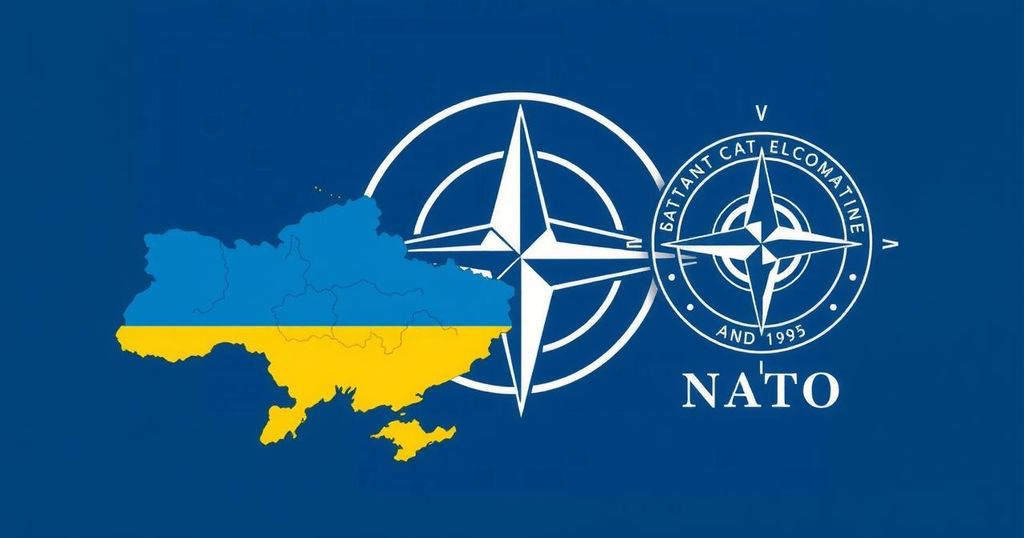US Elections Cast Uncertainty on NATO Support for Ukraine Amid Rising Military Aid to Russia
The upcoming US presidential election raises concerns over the future of American support for Ukraine amid NATO discussions. Allies worry that if Donald Trump wins, aid could diminish, especially with increasing military support for Russia from Iran, North Korea, and China. NATO is preparing for a potential reduction in US involvement, urging Europe to bolster its contributions. Meanwhile, production discrepancies in munitions between NATO and Russia complicate the outlook for Ukraine’s defense.
The recent meeting of NATO defense chiefs was overshadowed by the impending US presidential election, raising concerns about the sustainability of American support for Ukraine. If Donald Trump were to win, allies fear that US assistance could diminish, especially as nations such as Iran, North Korea, and China are bolstering military aid to Russia. During the closed-door discussions, Secretary of Defense Lloyd Austin acknowledged the uncertainty surrounding US involvement, while reassuring allies of the continued bipartisan support for Ukraine within Congress. NATO officials signaled preparations for a possible reduction in American leadership in this area. One senior official stated, “We can’t expect that the US will continue to take on an outsized burden” regarding assistance to Ukraine, emphasizing the need for Europe to enhance its contributions. The potential for a Trump administration has raised serious doubts about the future of US aid to Ukraine. Trump’s previous remarks about Ukrainian President Volodymyr Zelensky and the war have contributed to concerns. A NATO official expressed alarm at the current situation, stating, “I’m very worried… Optimistic is not the word I would use to describe the situation [in Ukraine] right now.” On the battlefield, Russia continues to outgun Ukraine significantly and retains a substantial advantage in personnel and resources as winter approaches. President Biden has also opposed extending US-provided missile capabilities to allow strikes deep into Russia, a stance that has drawn criticism from some NATO officials who believe such action is necessary. In an effort to adapt to the uncertain future, NATO has aimed to consolidate control over the training and military assistance for Ukraine, preparing for a potential reduction in US support. However, this initiative, termed the NATO Security Assistance and Training for Ukraine, has not yet reached full operational status. Simultaneously, European nations have sought to increase their production of essential armaments, both to ensure continuous aid to Ukraine and to bolster their own defense. Notably, delays in securing long-term funding for Ukraine’s military through EU and G7 initiatives have arisen due to Hungary’s objections related to US elections. Efforts by the Biden administration to ensure that Ukraine remains equipped for a protracted conflict have escalated, with significant investments now designated for Ukraine’s defense industry. Secretary Austin indicated that ongoing efforts are aimed at enhancing long-term capabilities within Ukraine, contributing to its overall success in the conflict. Despite these efforts by NATO and allied countries, there remains a significant disparity in munitions production, with Russia currently offering extensive support from North Korea, Iran, and China. NATO officials reported a production gap where Russia produces approximately 3 million munitions per year compared to the less than 2 million produced by the NATO alliance. The NATO Secretary General reaffirmed that the alliance would maintain unity regarding support for Ukraine, emphasizing the strategic importance of this assistance.
The ongoing conflict in Ukraine has drawn significant international attention, particularly regarding the support provided by NATO allies, predominantly the United States. The geopolitical implications of US elections on foreign aid are critical, as shifts in leadership can yield substantial changes in military support and policy direction. The involvement of nations like North Korea and Iran, which have commenced support to Russia, has further complicated the landscape and heightened concerns about the balance of power in the region. As NATO members gather to discuss these pressing issues, the specter of possible changes in US foreign policy looms large, particularly regarding ongoing aid to Ukraine amidst the upcoming presidential election.
In summary, the NATO meeting underscored the fragility of support for Ukraine, particularly in light of the US elections. With substantial military assistance currently in doubt, the alliance’s focus has shifted towards enhancing European contributions and consolidating control over Ukraine’s military training and support. Although efforts are being made to ensure continued aid and capability development within Ukraine, external factors, including rising support for Russia from other nations, add further complexity to the situation.
Original Source: www.cnn.com




Post Comment